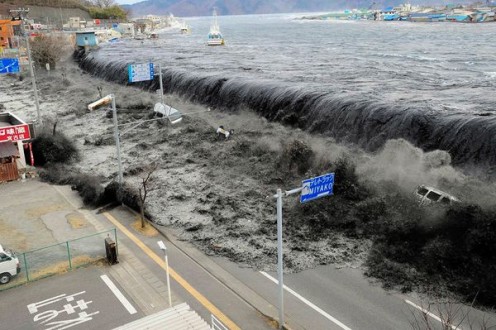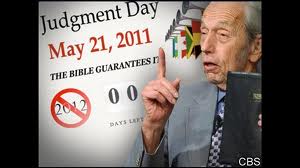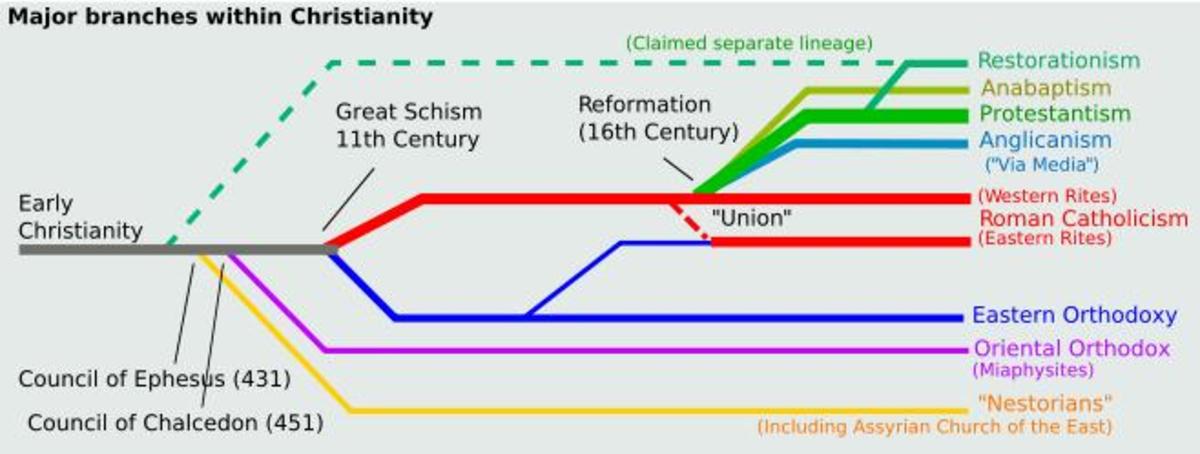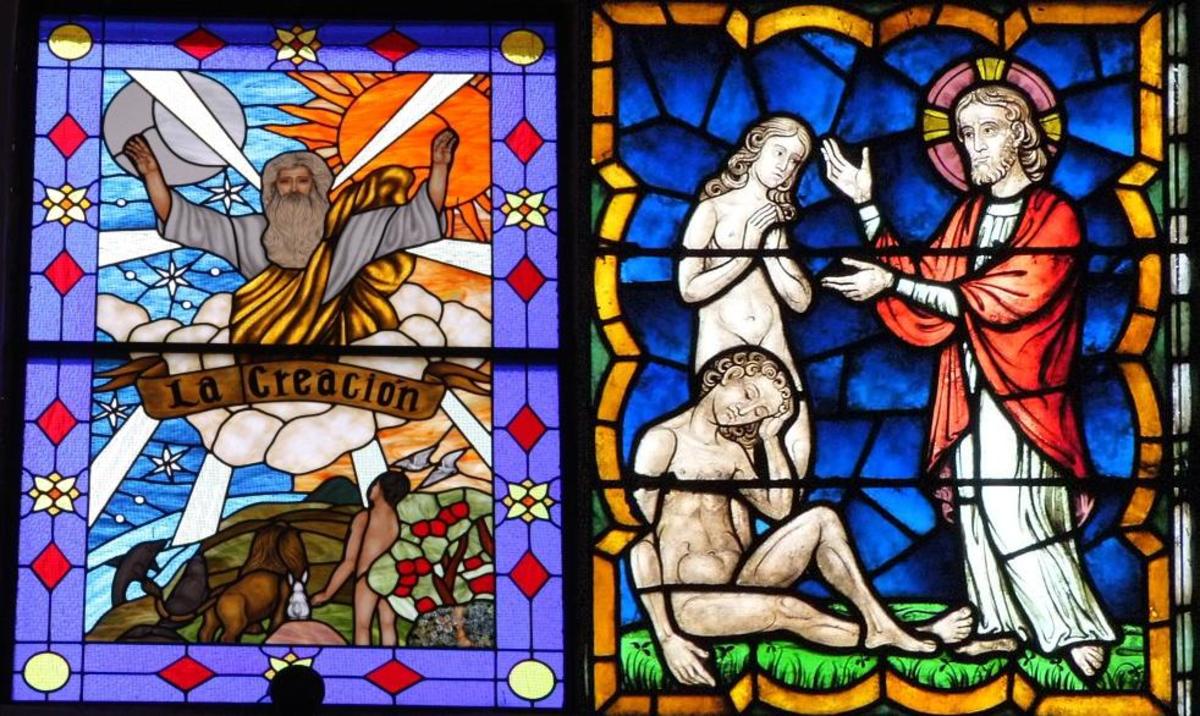Predicting Armageddon

God's Responsibility Poll
Does God use natural disasters as intentional punishment for human sin?
Silly Preachers, Predictions are for Scientists
The End of the World as We Know It?
It is now common knowledge that the Sun will eventually die out, ending life on Earth. Though it is most likely that humans will have died out as a species long before this event, it is nevertheless interesting to speculate on whether a divinity could be responsible for ending mankind in a grand and angelic orchestration of Heaven’s power. Contrary to popular assumption, not all of the Bible’s end of the world predictions are found in the Book of Revelation. The Bible is ripe with end of the world texts, some more subtle than others, some more plausible than others, and yet they all seem to be a pretty important component of the story. I mean, if you don’t believe Jesus when he talks about the end of the world, then why believe him when he says he’s the son of God?
Many of the proofs of the Bible’s veracity regarding a forthcoming apocalypse speak to the theme of people’s willingness to believe the signs they have been given. The texts state Armageddon as a fact, and then point to perpetual examples of human nature as proof. For instance, popular examples of the evidence for Jesus’s imminent second coming include the predominance of international war, the presence of false prophets, the existence of natural disasters, and of no less importance; the presence of multiple points of view regarding religion. Ultimately, the texts come in three varieties, those that describe the sinful conditions of society before Armageddon, those that describe the natural mechanisms by which the world will end, and finally, those that speak to the supernatural nature of Jesus’s return and the ensuing battle with Satan.
A Note on Sources
I chose not to footnote here because the claims and ideas come from the Bible and are shared and rehashed throughout the internet world. A basic Google search of end of the world literature will produce pages upon pages of websites that offer scriptural interpretations and current event driven prophecy fulfillments, along with a variety of other services. The simple truth is that the rapture may be many people’s great fear, another’s great joy, and still for others, simply a business. Although, we all go about our daily lives without any real sense of fear that the ancient Christians were right about the apocalypse, entrepreneurs can still make money preying on people’s gullibility. Want to save your pet at the rapture? There’s a website for that. Want to write an email from Heaven? There’s a website for that. I offer the following websites for their overall creativity and inspiration in making me want to write something about how irritating they are.
http://www.endoftheworldprophecy.com/
Behaviors that will lead to Armageddon
Societal Indicators of Armageddon
The Bible says that in the end times some people will believe, and others will doubt, Jesus’s divinity. One of the markers of the end, will be the point in time in which all the world has knowledge of Christianity, thus all people are forced to make the decision to believe or not to believe (Mathew 24:14, NRSV). The Bible is one of the bestselling books of all time. Since the printing press was invented the Bible has been mass produced, translated into new languages, splintered into numerous versions, and consumed by the masses. And yet, even as Christianity is the world’s largest religion, almost six out of seven people are not Christians. Many people in secluded regions of the world still don’t know that God came to Earth two thousand years ago to visit the desert and play muse in the publication of a book. If Mathew is saying that spreading the Gospel is the mechanism that eventually triggers the end of the world, it would seem prudent not to do so. For many of the early recipients of the gospel’s spread, the world really did come to an end.
By comparison to the modern world, which we all know to be large and incredibly diverse, the ancient Christian world was extremely small. Its inhabitants were unaware of the existence of a majority of the world’s population. Christianity spread remarkably over the centuries, mainly because it was a state sponsored religion that you could be killed for not being a member of, and maybe killed even if you were a member. Yet, if there was ever a time when a Christian could reasonably believe that their particular religion’s success was proof of its truth by virtue of its sheer dominance, then that time has long passed. The world is known to be larger now. End of the world preachers nevertheless continue to cite the fact that there are so many Christians in the world, leaving out everyone else.
Once people know about Christianity, we’re left to explore people’s attitudes towards its truths. Peter says that in the final days many will mock religion, asking where is God (2 Peter 3)? Peter talks about the existence of skeptics and atheists as being proof of apocalypse. Of course, Thomas, who was one of the apostles, knew Jesus very well as a person, and didn’t believe he was divine until after the resurrection. Likewise, consider that the Jews of Exodus, who enjoyed countless miracles on their behalf including, but not limited to, the splitting of the Red Sea, the creation of bread from morning dew, the death of the first born children of their enemies, and the divine right to own land that was already inhabited. Yet, at nearly every stage of the flight from Egypt the Jews were on the verge of turning on Moses, Aaron, and the God who had performed these miracles on their behalf. Moses at one point warns God that he’s close to being stoned to death by the masses. It seems fair to say that skeptics have always been around in one form or another.
Daniel tells us there will be a time of great and unprecedented turmoil, after which the dead will awaken to everlasting glory or contempt, and that “knowledge will be increased” amongst the masses (Daniel 12). Believers, who have the knowledge of God, are evidence for apocalypse. One of the problems with using “great and unprecedented turmoil” as a marker is that for conscious people, life is entirely relative to the world we live in. It’s all unprecedented. Who’s to say which genocide is more horrible than another? A lot of people died in World War Two, and yet despite being the deadliest war in human conflict, only a relatively small portion of the world’s population actually died. The world we live in has greater technology, and stronger weapons then the Biblical world. The future kids of the world will likewise grow up in an entirely unrecognizable place from the one that currently exists.
Timothy simply lays out a list of vices and poor moral actions claiming that these will be abundant in society at the end (Timothy 3). But what makes the Bible the moral authority, other than the Bible itself? I think most people could agree that producing human sacrifices by any means, is a poor moral decision, even when the sacrifice is a willing participant. Yet, God has come out decidedly in favor of it, demanding sacrifices on more than one occasion. For God so loved the world that he gave his one and only son… If we consider a Christian moral code that is wrong about human sacrifice, wrong about slavery, wrong about the treatment of women, wrong about its treatment of non-Christians, wrong about its belief in witches, wrong in its propagation of anti-Semitism, and absolutely impossible to be successfully compliant with; can we really say that the presence of sin is an indicator of anything at all? Simply listing vices which are prevalent in every society is no more proof of humanity’s failure then virtue can be considered proof of God’s existence. Can it not be the case that wickedness and virtue are the products of conscious minds at work? The Biblical moral code is impossible to comply with, because it is conflicting, it is often itself immoral, and it punishes for things that are out of a person’s own control. Consider Exodus 20:5, and ask what kind of a moral code punishes a person for the sins of their grandparents?
In Jesus’s lecture at the Mount of Olives, he foretells the ending of the world and the death of the vast majority of the population, while adding that while many hearts will grow cold and be cast into Hell following God’s wake, others will not lose faith but will ultimately be saved for it (Mathew 24). The core message here is that blind faith is a virtue. It isn’t really about overcoming doubt. If a God wanted to be worshiped and believed in, it would behave in a manner that was conducive to that end. It wouldn’t present itself for the creation of an ancient text and then disappear. It could simply appear and issue its edicts, and so forth. If a God wanted belief to be a challenge, a form of test, it could present itself from time to time, or perform undisputed miracles, or do something to promote hope in the wake of its absence in regard to all forms of human suffering. Only a God who required blind faith to be virtuous would leave us in the condition we’re in, with no miracles and no evidence at all to aid our belief.
Jesus also warns that there will be many false idols and deceivers at the end time (Mathew 24). This warning is often a particular favorite for the religious. I also find this passage to be important because it highlights a paradox in Christianity. On the one hand it praises blind faith, while on the other it warns about the consequences of believing false prophets. How can blind faith be scrutinizing enough to separate the real prophets from the false prophets? If one is commanded to have blind faith, but has to be in some sense skeptical as to likewise be in compliance, how can they possibly succeed? It’s a no win situation. How can a God that operates this way expect love and not fear? An omnipotent God is capable of anything by definition. If this omnipotent being chose a course of action in which the extreme majority of all of its creations are damned to Hell by design, how can it possibly be considered loving and merciful?
A Good Video Synopsis
The Natural Signs of Armageddon
Environmental Indicators of Armageddon
While the previous versus speak to the attitudes of the masses at the end time, they do not describe the mechanism of the world’s destruction. Given the utter lack of understanding of the natural world at the time the Bible was written, it’s no surprise that several prophets saw the world come to its end by means of nature’s wrath being directed at humanity. Fires and floods, earthquakes and disasters, famines and droughts are all cited as proof of the end. Luke must have been very keen on astrology, for he recites that the coming of the end will be foretold in signs appearing in the sky, involving the Sun, the Moon, and the stars (Luke 21). This use of astrological signs as a warning system to the masses is again offered in the Book of Revelations.
While I see the arguments for society’s sin being the cause of God’s wrath to be illogical, improbable, and all around nonsensical, it’s the arguments about nature that are particularly disturbing to me, partly because of the circular logic they invoke, but mostly because the natural world really is displaying signs. When it comes to natural disasters, there are only two real camps. The first is made up of scientists who have spent their time and effort working on the study of nature. They can offer accurate predictions about weather patterns and disturbances, though their predictions about the eroding stability of our environment are often ignored. The second group is made of theists, who aren’t trained in any environmental discipline and yet spend their time and resources claiming to simply know that God is responsible for natural calamity. Their predictions are taken quite literally in some cases, while others choose not to blame God for nature’s wrath, but do consider God the arbiter of everything.
It is my contention that the logic employed by the theists with regard to the environment is circular. To begin, the religious argue that only God can end the world. They say that global warming is not the product of human activities, that oil and natural gas should be mined and consumed with no thought of tomorrow, that God wants us to subdue the Earth. They fight for, and actively advocate for, fewer regulations on businesses which damage nature. As a result, the polar icecaps are melting at an alarming rate, environmental standards for the air and water are continually being trimmed off, and the amount of biodiversity in the world’s ecosystem is shrinking. Scientists recently warned that as a result of human impact on the environment and over-fishing, a mass extinction of oceanic life is imminent within a generation. Then, in the face of the world WE have created, the theist turns and says, “see I told you so, God is punishing us.” So in the first place God is used as evidence for not worrying about causing natural devastation, and then the circle closes when natural devastation is used as proof of God.
Religious groups always count God to be on their side when they blame hurricanes, earthquakes, tornados, and the like, on whatever they themselves disapprove of. After the recent disaster in Japan a Public Religion Research Institute poll of over a thousand American adults found that 44% of Americans believe natural disasters are, or could be, signs from God. Evangelicals were also found to be the most likely faith to see proof of God in disaster. A full 59% of white evangelicals think God communicates through natural disaster while 67% of the same demographic see natural disaster as a sign of end-times. A majority of Evangelicals also believe God punishes entire nations for the sins of a few, a view which is held by only about 18% of other Christian faiths. Amazingly, the same poll found that only 18% of people cast doubt on their religious beliefs because of innocent human suffering. So when a hurricane or tsunami hits, God is most likely believed to be responsible, but when millions of kids die like clockwork each year, it doesn’t necessarily mean anything. Evangelical preacher Billy Graham’s website includes a detailed section on natural disasters in which the case is made that due to original sin, all of nature is cursed. Man’s punishment is the environment, and it follows that “nature is God’s megaphone” for sending his pronouncement of his dissatisfaction with man. This sort of thinking has to be called by what it is, insane.
So What Does this mean?
Ultimately, the societal indicators of Armageddon as presented in the Bible offer no real help in determining when the end will come, or whether it will come at all. If the Bible pointed to a specific event, or a specifically prevalent belief, then we would all know what to look for, and could see demonstrably if the prediction were true. Instead, the verses simply describe what has always been true of society. Some believe, some don’t, and others deceive. This is not proof of apocalypse, but rather a sadistic, catch-all way of describing society in which all bases are covered because the very existence of points of view becomes evidence. Every prediction has believers, and skeptics. This doesn’t normally lend itself to making the statement true. Somehow, two thousand years after the appearance, death, resurrection, and retelling of God’s time on Earth, the existence of doubt is still considered a proof of God.
All Things Considered
It has been my goal to offer an extremely brief argument against the validity of Biblical Armageddon texts. A person can’t fear a prophecy they haven’t heard of, and it is more than safe to say that all of us are uninformed of the extreme majority of the end of the world prophecies that have ever been made. (Think of all the tribes, all of the island cultures, all the other religions, and the fact that these predictions are made all the time) It doesn’t tend to bother us when we’re uninformed about another group’s religious or cultural, destruction myths, and I think the Christian ones shouldn’t bother us either. Countless numbers of prophets and people have predicted the end of the world, all falsely. Nearly all of the cultures that ever been studied or observed possess end of the world prophecies, it doesn’t make any of them true.
Like most predictions, the Biblical verses of Armageddon are carefully crafted to exist without falsifiability, while having the appearance of making a genuine prediction about future events. The texts include just enough details to fool the reader into believing that the prediction has a foundational basis, while in reality, it withholds enough information to create a context in which the prediction can never actually be falsified. There are no actual dates presented, no undisputable signs offered, nothing better than the offerings of a random seer, who can tell you that there’s a spirit in the room with the latter E in her name, but you’re going to have to fill in the rest of the story for yourself. The major marker in the perceived validity of any given prophecy resides principally in religious culture. A good apocalypse prophecy can lead a person in the twentieth century to believe that their world will end, despite the knowledge that a person in the eighteenth century falsely believed the same thing.
Harold Camping Hard at Work!










